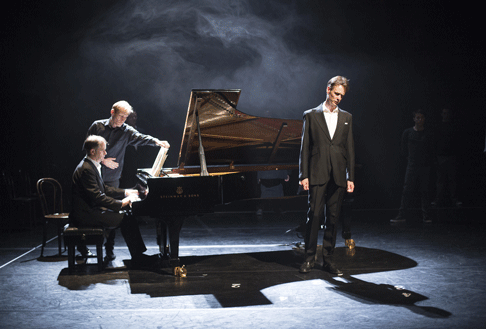Twenty-seven years separate the first and last Canticles and in
some ways these intimate, dense narratives represent a composing life,
exhibiting Britten’s stylistic preoccupations and expressive concerns at
various points in his career. There are certainly musical and thematic links
between the individual Canticles but, performed as a sequence, do they
cohere? In a programme article, Paul Kildea finds common ground in their
dramatic concentration, their ‘opulent’ poetic language, and the fact that
each Canticle is dedicated, ‘in name or spirit, to one of Britten’s
heroes’.
By assigning each Canticle to a different director, Bartlett and
Constable perhaps make their task even more difficult; then there is the
further problem that, with their varying moods and energies, when performed in
sequence the Canticles do not form a naturally persuasive dramatic
form.
Bartlett remarks that the Canticles ‘get a great deal out of the simplest
musical resources, they excavate extraordinary and multiple levels of sense
from their words’. And so they do; the rich textual imagery is translated
into densely evocative music, which is why they do not need further visual
accompaniment. Indeed, concrete embodiments of Britten’s musical images risk
either distracting from the musical performances, or being ignored as the
audience focuses inevitably on the medium which expresses the composer’s
meaning most directly - especially when it is communicated through vocal and
instrumental performances as powerful as those heard here.
Such problems were most apparent in the first Canticle, ‘My
Beloved is Mine’, a setting of text adapted from theSong of Solomon.
Written for and first performed by Peter Pears, this is a lyrical, joyful
celebration of love and sexual passion. Ian Bostridge’s beautifully unfolding
raptures faded sweetly into relaxed whisperings; alongside this Bartlett
offered a mundane morning routine, as two men (actors Peter Bray and Edward
Evans) enjoyed a demure breakfast before departing for a day in the office.
Presumably Bartlett wished to suggest a natural, everyday union of the
spiritual and the sexual, but the darkness which divided the stage, separating
the music from its visual interpretation, embodied the huge chasm between the
expressive register of the music and the mime.
Scott Graham’s balletic interpretation of the second Canticle, a
retelling of the biblical father-son drama, ‘Abraham and Isaac’, was less
intrusive, the tender gestures of his two dancers (Chris Akrill and Gavin
Persand) forming a reserved yet affecting dramatization of the narrative as
recounted and enacted by the richly blending voices of Bostridge and
countertenor Iestyn Davies.
 Julius Drake and Ian Bostridge
Julius Drake and Ian Bostridge
The third Canticle, ‘Still Falls the Rain’, was accompanied by John
Keane’s video illustration of the manufacture of weaponry and the carnage
wrought by aerial bombardment juxtaposed with Christian iconography. The visual
oppositions and associations were an apt expression of Edith Sitwell’s
vehement poem with its bitter diction and insistent repetitions. Moreover, the
striking visual contrasts complemented the musical antagonism of voice and
horn, as Bostridge’s hesitant, lamenting ‘refrain’ meandered seemingly
unaware of Richard Watkins’ eerie horn calls from afar, until the two strands
united peacefully at the close. But, the images were an adjunct rather than
integral; to be glanced at but not too deeply reflected upon, for it was the
music which commanded one attention and shaped one’s emotions.
The fourth Canticle involved no extraneous diversions, and for this
reason Constable’s presentation of T. S. Eliot’s ‘Journey of the Magi’
was the most powerfully suggestive. Bostridge and Davies were joined by
baritone Benedict Nelson, and the three singers, weary travellers with scuffed
suitcases by their sides, reflected hauntingly on their life-journey, which has
brought them not knowledge, understanding and faith, rather anxiety,
incomprehension and disenchantment.
Britten returned to Eliot in the final Canticle, a setting of
‘The Death of St Narcissus’. Responding to Eliot’s lines, ‘So he became
a dancer to God/ Because his flesh was in love with the burning arrows/ He
danced on hot sand/ Until the arrows came’, Wendy Houstoun presented a single
dancer (Dan Watson) spinning ceaselessly, as if spurred on by the troubling
dissonances between Bostridge’s striving melodies and the eloquent
interjections of Sally Pryce’s harp. In the final moments, harp and voice
were reconciled, as the dancer’s spirals and the harp’s expansive ringing
octaves faded into the oblivion of shadows.
Musically this was a stunning performance, underpinned by the intelligent,
responsive piano accompaniment of Julius Drake. Singers and instrumentalists
unfailingly communicated the urgent drama of each Canticle,
sensitively alert to every contradiction and inference. No more was needed.
Claire Seymour
There are two further performances at the Linbury Studio,
ROH, on 11th and 12th July, at 7.45pm.
Cast and production information:
Ian Bostridge: tenor; Iestyn Davies: countertenor; Benedict Nelson:
baritone; Julius Drake: piano; Richard Watkins: horn; Sally Pryce: harp; Neil
Bartlett: Scott Graham: John Keane: Paule Constable: Wendy Houstoun: directors;
Edward Evans: Peter Bray: actors; Chris Akrill and Gavin Persand (from Ignition
Physical Theatre): Dan Watson: dancers. Royal Opera House, London, Wednesday
10th July 2013.
![Edward Evans and Peter Bray [Photo © ROH/ Tristram Kenton]](http://www.operatoday.com/Canticles-88.gif)
